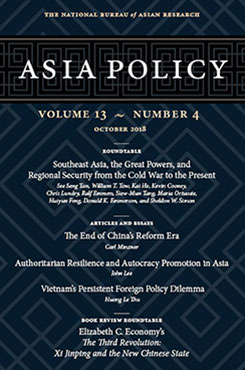Vietnam’s Persistent Foreign Policy Dilemma
Caught between Self-Reliance and Proactive Integration
This essay argues that “self-reliance” and “proactive international integration”—the two driving concepts in Vietnamese foreign policy since the Doi Moi (open door) era—are increasingly difficult to reconcile in the wake of China’s pursuit of regional and global dominance.
EXECUTIVE SUMMARY
MAIN ARGUMENT
Vietnam’s partial reforms to its foreign policy have created an ideological dilemma between the contending conceptions of self-reliance and proactive international integration. The country’s foreign policy shift toward greater international political and economic integration since the Doi Moi era in the late 1980s has contributed to its postwar development and re-established the country’s position in the international arena. The reforms responded to the main threat of the time: regime collapse and economic disaster. The full expression of this change in defense policy has been restrained by the Vietnamese Communist Party’s adherence to the principle of self-reliance. While sustaining an independent foreign policy has been a strength for Vietnam in the past, self-reliance has limited alignment options in defense policies. Despite the overall accomplishments of diplomacy and the expanding areas of security cooperation, they seem disproportionately small in comparison with the challenges that Hanoi is facing. In the wake of growing tensions in Vietnam’s neighborhood, especially in the South China Sea, the main security challenges are now threats to sovereignty. Vietnam urgently needs to recalibrate and open its foreign and defense policies in response to the pressing challenges to its territorial integrity.
POLICY IMPLICATIONS
- Unlike in the Doi Moi era, today Vietnam’s top priority increasingly is the defense of sovereignty—particularly given China’s unilateral actions in the South China Sea.
- Integration rescued the Vietnamese economy and re-legitimized the socialist regime, but the government now fears deepening security relations because of its long-held value of self-reliance.
- Given the positive trajectory of security cooperation with Japan, the U.S., India, and Australia, Vietnam should develop a policy that includes advanced security cooperation—in the form of new “yes’s” that serve national interests. This would be a positive addition to the existing policy of “three no’s.”
Huong Le Thu is a Senior Analyst at the Australian Strategic Policy Institute.
About Asia Policy
Asia Policy is a peer-reviewed scholarly journal presenting policy-relevant academic research on the Asia-Pacific that draws clear and concise conclusions useful to today’s policymakers. Asia Policy is published quarterly in January, April, July, and October and accepts submissions on a rolling basis. Learn more


